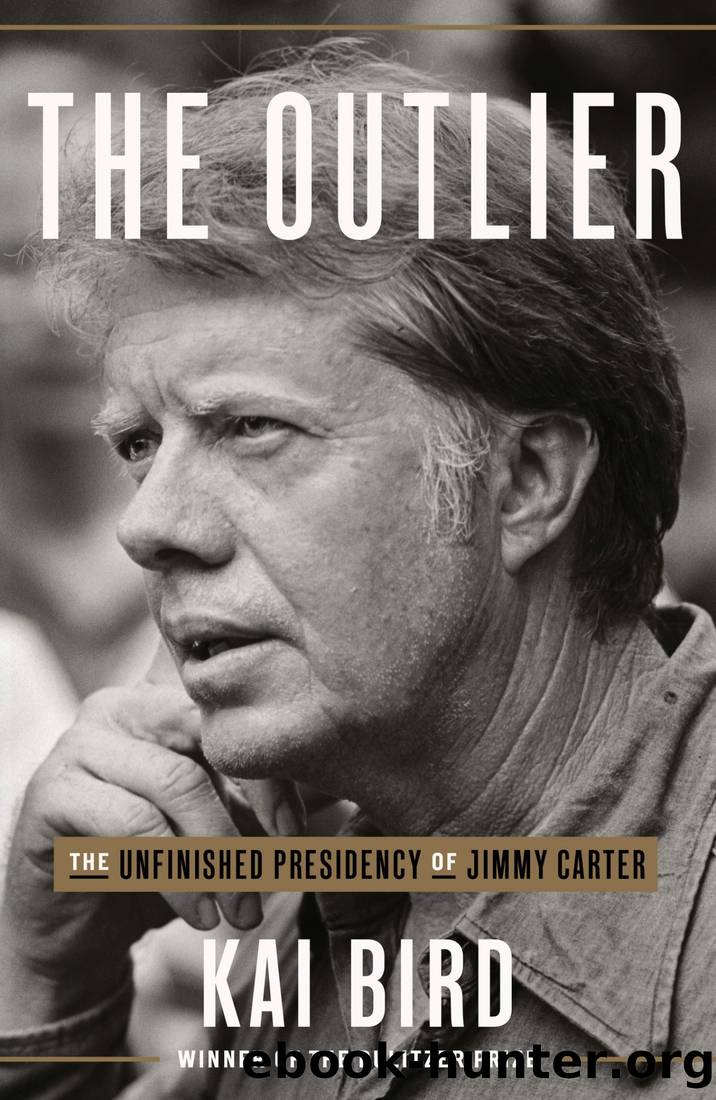The Outlier by Kai Bird

Author:Kai Bird [Bird, Kai]
Language: eng
Format: epub
Published: 2021-06-15T00:00:00+00:00
* * *
â
âIâm increasingly concerned about Iran,â Carter wrote in early December. By then, it was clearly very late in the game. That week, Ambassador Akins returned from the region and sent the White House a candid assessment of the Iranian situation. âOur reporting from Iran,â Akins wrote to Brzezinski, âwas frequently colored by what we all hoped to be true: that the shah would continue in power indefinitely.â All of this intelligence was just flat wrong. Akins believed âthe shahâs power has already been usurped.â The regime was falling apart from âthe extraordinary corruption of the shahâs twin sister, his other sisters and brothers, his nieces and nephews and his mother-in-law.â Akins knew that Brzezinski was strongly inclined to believe that the Carter administration should intervene militarily, perhaps by supporting an army coup, to rescue the shah. âI cannot see how this would be successful,â Akins wrote. âWe certainly could not keep any action secret.â And an ineffectual American intervention âwould only ensure that the successor government would be even more anti-American than we must expect it to be.â
Akinsâs observations were both astute and dispassionate. But his advice would be ignored. Brzezinski ardently believed that the president should signal his support for the shah âwithout reservationâ and urged the Iranian monarch to take âdecisive actionâ to restore order. Zbig simply assumed that the Soviet Union and local Iranian communists must be orchestrating the street protests. As evidence, he gave President Carter a New Republic article written by Robert Moss, an Australian reporter who had made a reputation for himself as a âprofessional anti-communist polemicist.â It was flimsy reporting from a highly biased source. Brzezinski had no real understanding of Iranâs internal politics, but he articulated, as usual, a forceful position. The shah was pro-Western and anti-Soviet, so Brzezinski thought the monarch should be supported absolutely.
The president himself was disconcerted to realize that as the crisis escalated his advisers were sharply divided. The State Departmentâpushed by another seasoned diplomat, Henry Precht, the country director for Iranian affairsâbelieved that the shahâs regime was unraveling. Precht had served as a political officer in the U.S. embassy for four years (1972â76), and by 1978 he was arguing that Washington had to prepare itself realistically for a post-Pahlavi revolutionary government. Precht had opened up a back channel to Dr. Ibrahim Yazdi, an Iranian American medical doctor living in Texas who was helping to organize anti-shah protests in the United States. Yazdi supported the Ayatollah Ruhollah Khomeini, the Shiâa cleric who was inspiring the revolution with his taped sermons from exile in Iraq and later France. Precht and other Foreign Service officers like him were hopeful that if the Pahlavi regime collapsed, it would be replaced by a coalition of secular-oriented followers of the Mosaddegh-era National Front. But even Precht later conceded that he âdid not have a real sense of Khomeiniâ¦.My impression at the time was that Ayatollah Khomeini wanted to set up a secular governmentâ¦and the clerics would be in the background.â This vague perception of Khomeiniâs intentions would prove to be terribly misguided.
Download
This site does not store any files on its server. We only index and link to content provided by other sites. Please contact the content providers to delete copyright contents if any and email us, we'll remove relevant links or contents immediately.
Blood and Oil by Bradley Hope(1558)
Wandering in Strange Lands by Morgan Jerkins(1416)
Ambition and Desire: The Dangerous Life of Josephine Bonaparte by Kate Williams(1383)
Daniel Holmes: A Memoir From Malta's Prison: From a cage, on a rock, in a puddle... by Daniel Holmes(1324)
Twelve Caesars by Mary Beard(1312)
It Was All a Lie by Stuart Stevens;(1293)
The First Conspiracy by Brad Meltzer & Josh Mensch(1166)
What Really Happened: The Death of Hitler by Robert J. Hutchinson(1154)
London in the Twentieth Century by Jerry White(1145)
The Japanese by Christopher Harding(1129)
Time of the Magicians by Wolfram Eilenberger(1125)
Twilight of the Gods by Ian W. Toll(1112)
A Woman by Sibilla Aleramo(1092)
Cleopatra by Alberto Angela(1091)
Lenin: A Biography by Robert Service(1072)
John (Penguin Monarchs) by Nicholas Vincent(1068)
Reading for Life by Philip Davis(1023)
The Devil You Know by Charles M. Blow(1023)
The Life of William Faulkner by Carl Rollyson(979)
